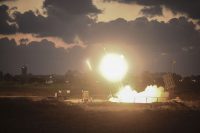
Israel’s Security Depends on Rafah
Unfortunately, Benjamin Netanyahu is right — “unfortunately”, I say, because he is the most incompetent, corrupt and divisive Israeli prime minister ever, as many in Israel believe. But he is right that it’s crucial for Israel to conquer Rafah and destroy the Hamas battalions ensconced in that city at the southern end of the Gaza Strip, protected by a human shield of some 1.4 million residents and refugees from the north.
If this does not happen, Hamas will survive to fight and murder and rape another day — and its leader, Yahya Sinwar, will emerge from his hiding place declaring victory.… Seguir leyendo »

